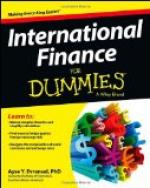CHAPTER III
INVESTMENTS AND SECURITIES
So far we have only considered what happens to the money of those who save as long as it is left in the hands of their bankers, and we have seen that it is only likely to be employed internationally, if invested by bankers in bills of exchange which form a comparatively small part of their assets. It is true that bankers also invest money in securities, and that some of these are foreign, but here again the proportion invested abroad is so small that we may be reasonably sure that any money left by us in the hands of our bankers will be employed at home.
But in actual practice those who save do not pile up a large balance at their banks. They keep what is called a current account, consisting of amounts paid in in cash or in cheques on other banks or their own bank, and against this account they draw what is needed for their weekly and monthly payments; sometimes, also, they keep a certain amount on deposit account, that is an account on which they can only draw after giving a week’s notice or more. On their deposit account they receive interest, on their current account they may in some parts of the country receive interest on the average balance kept. But the deposit account is most often kept by people who have to have a reserve of cash quickly available for business purposes. The ordinary private investor, when he has got a balance at his bank big enough to make him feel comfortable about being able to meet all probable outgoings, puts any money that he may have to spare into some security dealt in on the Stock Exchange, and so securities and the Stock Exchange have to be described and examined next. They are very much to the point, because it is through them that international finance has done most of its work.
Securities, then, are the stocks, shares and bonds which are given to those who put money into companies, or into loans issued by Governments, municipalities and other public bodies. Let us take the Governments and public bodies first, because the securities issued by them are in some ways simpler than those created by companies.
When a Government wants to borrow, it does so because it needs money. The purpose for which it needs it may be to build a railway or canal, or make a harbour, or carry out a land improvement or irrigation scheme, or otherwise work some enterprise by which the power of the country to grow and make things may be increased. Enterprises of this kind are usually called reproductive, and in many cases the actual return from them in cash more than suffices to meet the interest on the debt raised to carry them out, to say nothing of the direct benefit to the country in increasing its output of wealth. In England the Government has practically no debt that is represented by reproductive assets. Our Government has left the development of the country’s resources to private enterprise, and the only assets




